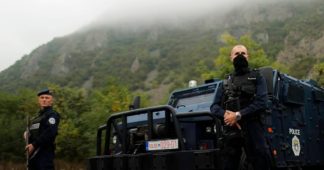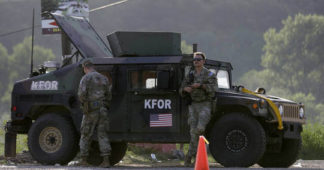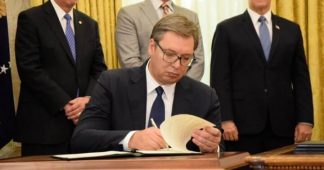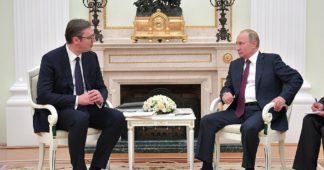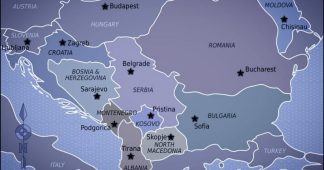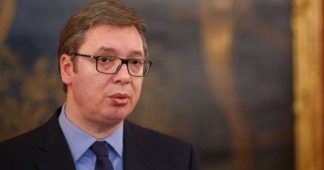Serbia ‘pushed to the wall’ – president
The nation is facing a “difficult night,” Aleksandar Vucic said amid a standoff in northern Kosovo
Serbia has found itself in an extremely tough situation, the country’s president, Aleksandar Vucic, said on Sunday following a meeting of the National Security Council. He also accused Pristina and Washington of showing scant respect for any agreements.
Vucic’s words came as tensions have flared up between Serbs and the Kosovo authorities in the northern part of the breakaway region, where Serbian protesters erected barricades over the weekend.
The standoff was nothing less than “an attempt to end the Serbian problem in Kosovo,” Vucic stressed, blaming Pristina for the tensions and accusing a “good part of the international community” of “participating” in the Kosovo authorities’ scheme.
At the international level, information about the situation in Kosovo is full of “direct falsifications, naked lies,” the president said, adding that “on the ground, we have a difficult struggle of a people for survival.”
Vucic, who claimed that Sunday was his “most difficult” day as president, urged Serbs in northern Kosovo to “be calm and peaceful and not to fall for provocations.” In particular, the president asked them to refrain from any aggressive moves against EULEX and KFOR, the EU- and NATO-led missions, respectively, stationed in Kosovo.
He also said Belgrade had received “assurances” from KFOR that it would not take “violent actions” against the demonstrators. “We will do everything to preserve peace and stability,” he added.
At the same time, Vucic accused the US of siding with Kosovo against Serbia by failing to respect agreements reached with Belgrade. Washington nurtured Kosovo like a “child” for some 20 years, the president said, maintaining that the US is now “protecting” it.
I have a question for our American partners: which agreements does Pristina respect and which do the Americans respect?
The standoff in the predominantly Serbian northern Kosovo was sparked by the arrest of a former police officer accused of attacking a Kosovo law enforcement patrol. Tensions were already running high after Pristina announced snap elections in the area, which were expected to be boycotted by all Serbian parties. On Saturday, Kosovo’s President Vjosa Osmani postponed the vote until April.
RT / thepressunited.com
Izvestia: Agreements on Kosovo could cover up Pristina’s military operations, Russian envoy says
The Brussels Agreement on Kosovo could be a cover for attempts to arm Pristina the way the Minsk accords were for Kiev, Russian Ambassador to Serbia Alexander Botsan-Kharchenko pointed out in an interview with Izvestia.
“Bearing in mind what revelations [former German Chancellor Angela] Merkel made about the Minsk Agreements, one can assume that the Brussels Agreement was most likely developed as a cover for Pristina’s military preparations. In recent years, an illegal Kosovo ‘army’ was created and Kosovo’s law enforcement and military agencies received equipment. For the West, the Brussels Agreement played the same role as the Minsk accords did with regard to Ukraine, it was a cover up,” he stressed.
According to the diplomat, Belgrade still insists on compliance with the existing documents and is unwilling to hammer out new accords. “[Serbian] President [Aleksandar] Vucic certainly insists that the parties resume talks on the implementation of the previously reached agreements on the Community of Serb Municipalities in Kosovo instead of developing new accords. The West, however, is acting deceptively, saying let’s start with a clean slate to see what can be done. It means making new decisions on the creation of the Community of Serb Municipalities as a non-governmental organization without any rights and powers,” the envoy noted.
The Russian ambassador also stated that it was too early to expect a sustainable solution to the Kosovo crisis. “There is little hope that a sustainable solution can be found to the Kosovo issue at this time, and I regret to say this. It will only be possible if the matter is fully brought back into the fold of international law and the United Nations Security Council based on its Resolution 1244,” Botsan-Kharchenko emphasized.
We remind our readers that publication of articles on our site does not mean that we agree with what is written. Our policy is to publish anything which we consider of interest, so as to assist our readers in forming their opinions. Sometimes we even publish articles with which we totally disagree, since we believe it is important for our readers to be informed on as wide a spectrum of views as possible.
